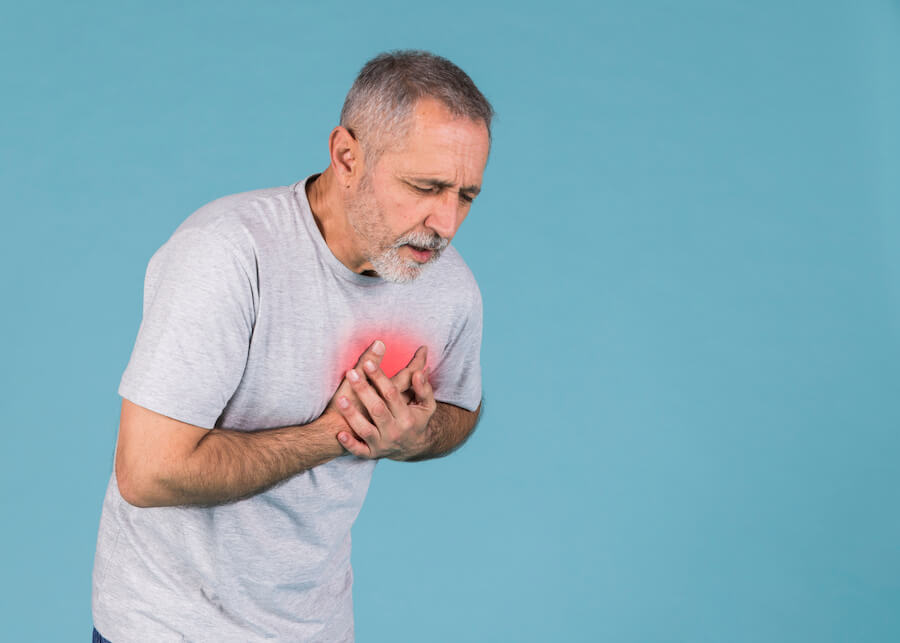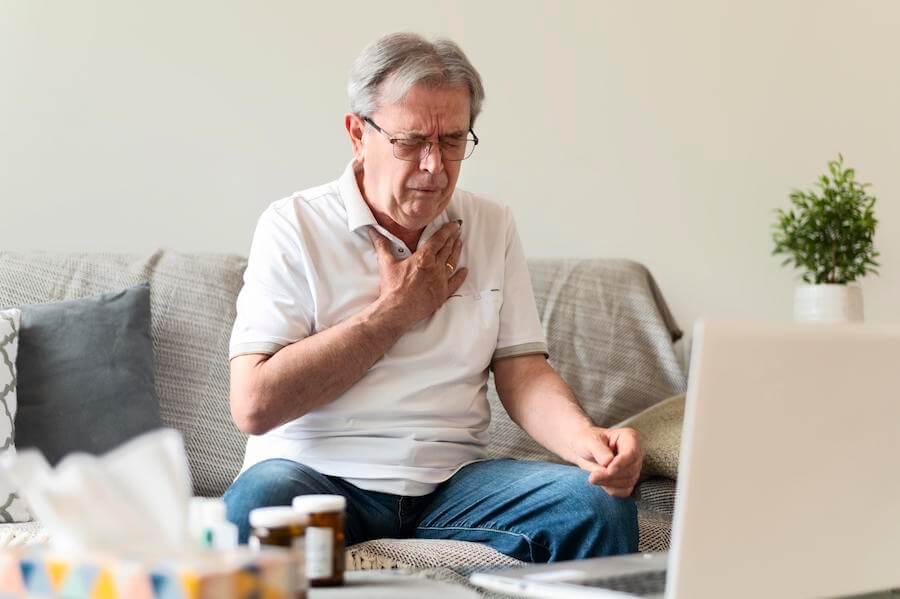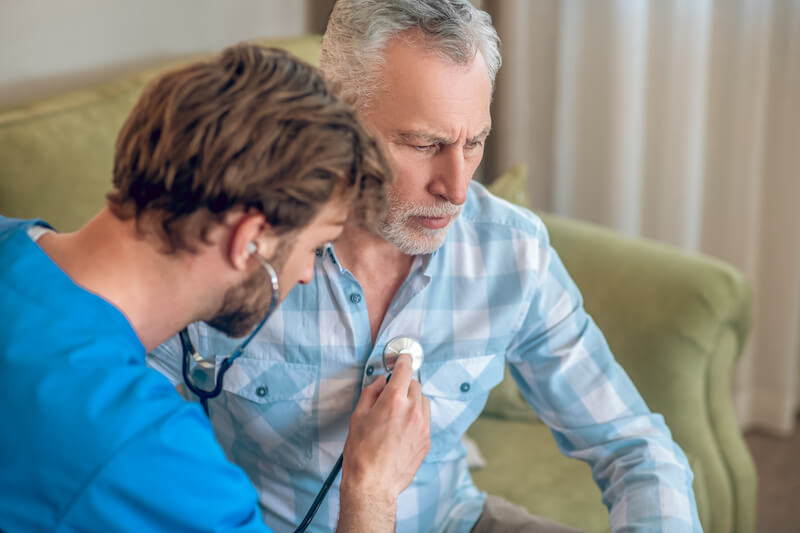Skipping a heartbeat or heart palpitations refer to a temporary sensation of the heart beating rapidly, skipping beats, fluttering, or pounding in the chest and neck. Stress, exercise, medications, and less commonly, certain health conditions can cause palpitations. Despite the unpleasant symptoms that may cause fear and anxiety in some individuals, palpitations are generally harmless. However, in some cases, these symptoms can be a sign of arrhythmia – an irregular heartbeat, which may require treatment depending on the type and clinical picture. Skipped heartbeats are one of the most common reasons why people visit a cardiologist.
Symptoms of irregular heartbeats – palpitations
- Fluttering sensation in the chest
- Rapid heartbeats
- Feeling of skipped beats
- Difficulty in heart function
How long does skipped heartbeat last?
Heart palpitations, such as pounding, skipping, or fluttering sensations, and rapid heart rate typically do not last long, ranging from a few seconds to a few minutes, although they can last longer in certain health conditions. The duration of palpitations depends on the underlying cause and the individual’s health condition.
Palpitations that are infrequent and last only a few seconds usually do not require evaluation. However, individuals with heart disease who frequently experience skipped heartbeats, especially if the symptoms worsen, should consult a cardiologist.

Causes of skipped heartbeats – palpitations
The causes of skipped heartbeats are not always related to heart problems; they can also be due to factors such as stress, anxiety, hormonal changes, caffeine, alcohol, or intense exercise. These causes of skipped heartbeats are generally not a cause for concern. Less commonly, skipped heartbeats can be caused by conditions such as iron deficiency anemia, overactive thyroid (hyperthyroidism), or heart rhythm disorders (arrhythmia).
Anxiety, stress, fear, and panic
Heartbeats can increase in response to specific stressful situations. Anxiety triggers the “fight or flight” response of the autonomic nervous system (ANS) and can lead to sensations of skipped heartbeats or fluttering. These sensations usually subside once the anxiety-provoking situation passes. Anxiety is the most common cause of palpitations unrelated to heart conditions.
Exercise
During exercise, adrenaline levels increase, which can lead to elevated blood pressure, increased heart rate, and a sensation of chest fluttering. After exercising, adrenaline levels in the body remain elevated for a while as the heart rate returns to normal. As adrenaline levels decrease, palpitations should also diminish. However, if palpitations occur during or after exercise and are accompanied by shortness of breath, chest discomfort, severe dizziness, or loss of consciousness, a medical evaluation is necessary.
Pregnancy
Heart palpitations during pregnancy are very common. During pregnancy, the volume of blood in your body significantly increases. Your heart works harder to pump the extra blood throughout your body and to the fetus. This additional workload can lead to heart palpitations. While they can be alarming, most heart palpitations during pregnancy are not dangerous. They usually disappear after giving birth.
Caffeine
In some individuals who are more sensitive to caffeine, it can cause skipped heartbeats and palpitations. Caffeine stimulates the release of noradrenaline and norepinephrine, hormones that increase heart rate and blood pressure. Additionally, caffeine can affect enzymes that stimulate heart contractions, causing the heart to contract more forcefully.
Overactive thyroid gland
An excess of thyroid hormones also causes the heart to beat stronger and faster and can lead to atrial fibrillation, rapid heartbeat accompanied by a sensation of skipped heartbeats.
Anemia
Anemia occurs when there is an insufficient number of red blood cells to carry oxygen throughout the body. When the blood has a low oxygen level, the heart works harder to compensate for the deficiency. This puts a significant strain on the heart, which can lead to a faster, irregular heartbeat, and pain.
Low blood sugar, potassium, and oxygen levels
When blood sugar levels drop below their normal range, the body initiates a hormonal response to try to restore those sugar levels to normal. These same hormonal responses can also lead to various symptoms such as skipped heartbeats, rapid heart rate, nervousness, and sweating. Hypokalemia, or low potassium levels, can manifest as different types of arrhythmias. Hypoxemia is low oxygen level in the blood, which can cause symptoms such as headache, shortness of breath, and rapid heartbeat.
Low levels of carbon dioxide in the blood
Heartbeats are influenced by breathing. Inhalation accelerates the heart rate, while exhalation, especially if it lasts longer than inhalation, slows down the heart. Over breathing involves the chest muscles, causing shallow and rapid breathing. This leads to a decrease in carbon dioxide levels, which can sometimes result in hyperventilation syndrome. Hyperventilation occurs when a person is anxious, and if it persists, it can cause a range of symptoms such as anxiety, palpitations, chest pain, and dizziness.
High temperature
During illness, when the body temperature rises above 39°C, the body consumes energy faster than usual, which can cause palpitations.

Dehydration
Due to fluid loss, there is a decrease in blood pressure and can result in heart palpitations and skipped heartbeats.
Blood loss
If there is sudden blood loss, both mean arterial and pulse pressures decrease, while the heart rate increases. If the bleeding is stopped, arterial pressure slowly recovers, and the elevated heart rate decreases as long-term compensatory mechanisms are activated to restore normal arterial pressure. The recovery time is longer with greater blood loss.
Medications
Inhalers for asthma, beta blockers taken for high blood pressure or heart conditions, medications for thyroid disorders, and antiarrhythmic drugs, as well as certain cough/cold medications, including decongestants, and some herbal and nutritional supplements can cause an increased heart rate, palpitations, and a sensation of skipping or pounding.
Use of drugs such as cocaine, amphetamines, ecstasy
The use of illegal drugs such as cocaine, amphetamines, and ecstasy is dangerous for the heart. Cocaine raises blood pressure, accelerates heart rate, and damages the heart muscle. Amphetamines stimulate the nervous system, leading to an increased heart rate and irregular rhythms. Ecstasy triggers the release of a chemical called norepinephrine, causing the heart to beat faster.
Nicotine
The chemical found in cigarettes and other tobacco products that causes addiction, raises blood pressure, and accelerates heart rate. Therefore, it is important to quit smoking as soon as possible. Palpitations can also be a symptom of nicotine withdrawal but should subside within 3 to 4 weeks after quitting smoking.
Alcohol
Excessive alcohol consumption can lead to a sensation of a faster heartbeat or palpitations. For some individuals, even a small amount of alcohol is enough to produce this effect.
Arrhythmias as the cause of heart palpitations
The cause of heart palpitations can be cardiac arrhythmias, such as supraventricular tachycardia, atrial fibrillation, ventricular tachycardia, as well as premature ventricular contractions. Heart palpitations are often a sign of arrhythmias if you have heart conditions such as a previous heart attack, coronary artery disease, cardiac arrest, issues with heart valves, and heart muscle problems.
Complications of heart palpitations caused by heart conditions
For skipping the heart caused by heart disease, possible complications can be:
Fainting: If the heart beats rapidly, blood pressure may drop, leading to fainting (more likely in individuals with congenital heart diseases or certain valve problems).
Cardiac arrest: Rarely, palpitations and rapid heartbeats can be caused by life-threatening heart rhythm problems and can cause the heart to stop beating effectively.
Stroke: If palpitations result from a condition where the upper chambers of the heart quiver instead of beating properly (atrial fibrillation), blood can accumulate and cause the formation of blood clots. If a clot is released, it can block a brain artery, causing a stroke.
Heart failure: It can result from arrhythmia. Sometimes, controlling the rate of arrhythmia causing heart failure can improve heart function.
When do heart palpitations occur?
Heart palpitations can occur at different stages of life and in various situations. Some people experience heart palpitations:
-After eating: Spicy or high-calorie food can cause heart palpitations and a rapid heartbeat, as well as drinks containing caffeine or alcohol.
-During the night: The same symptoms as during the day, but they may be more noticeable at night when there are no other distractions.
-In a lying position: Sleeping on one’s side can increase body pressure, leading to palpitations – rapid heartbeat, skipping beats, pounding, or fluttering.
– All day: In case the heart is working fast and “skipping” all day, you should see a doctor.
-Due to hormonal changes: Hormonal changes in women, especially during pregnancy and menopause, can cause a rapid heartbeat.
-Stress, fear, anxiety: Conditions that can lead to a rapid heartbeat and heart palpitations. In most cases, palpitations disappear when the cause of fear or anxiety is gone.
Diagnosis of irregular heartbeat – palpitations
During the diagnostic process, it is essential to determine whether the heart palpitations are caused by stress or minor arrhythmias rather than those that may indicate an underlying heart condition.
To diagnose palpitations, the doctor will perform a physical examination of the patient and listen to the heart using a stethoscope. During the examination, the doctor will look for signs of health conditions that can cause heart palpitations, such as hyperthyroidism. They will also review the patient’s medical history and may order blood and urine tests.
If the doctor suspects that the heart palpitations are caused by irregular heartbeats – arrhythmia or other heart conditions, they may refer the patient for further diagnostic tests, including:
Electrocardiogram (ECG)
This quick and painless test measures the heart’s electrical activity. The ECG can show whether the heart is beating too slowly, too fast, or not at all.
Holter ECG
This portable device is worn for a day, 48 hours, or more to record the number of heartbeats and rhythm during daily activities. It is used to detect heart palpitations that may not be evident during a regular ECG examination.
Holter monitor
If the Holter ECG has not recorded an irregular heart rhythm, the doctor may suggest an event monitor that is usually worn for up to 30 days or until arrhythmia symptoms appear.
Electrophysiological (EP) examination
This test evaluates the heart’s electrical system or activity and is used to diagnose abnormal heartbeats or arrhythmias. The test is performed by inserting a catheter with wire electrodes that measure electrical activity through the blood vessels entering the heart.
Echocardiogram (heart ultrasound)
It can show problems with blood flow and the heart’s structure.
Chest X-ray
X-ray used to examine the heart and lungs.
Stress test
It shows how the heart performs under stress, i.e., increased physical activity.
Treatment for irregular heartbeat – palpitations
Depending on the severity of the symptoms and the underlying cause of heart palpitations, the doctor will typically recommend one of three treatment options:
Preventive care (for harmless heart palpitations) – This involves eliminating smoking, reducing, or avoiding the consumption of caffeine and alcohol, engaging in regular physical activity, practicing deep breathing and yoga exercises, getting enough sleep, and maintaining a healthy diet.
Medications – The doctor may prescribe antiarrhythmic medications such as beta-blockers and calcium channel blockers for treatment. In some cases, these medications may not be effective, and stronger antiarrhythmic drugs may be required.
Catheter ablation – This procedure involves eliminating a portion of the heart muscle tissue that is causing the arrhythmia, usually using the energy of radiofrequency. This treatment is highly effective when the doctor can identify the specific location of the arrhythmia in the heart (e.g., supraventricular tachycardia).
Other procedures that may be applied include:
Cardioversion – Electrical cardioversion is a medical procedure usually performed by delivering electric shocks to the heart through electrodes placed on the chest to normalize heart rhythm. Cardioversion can also be done using medications.
Implantable cardioverter-defibrillator (ICD) – This is a special type of device that automatically detects and interrupts ventricular arrhythmias associated with heart conditions.
What can you do at home?
The most appropriate way to treat heart palpitations at home is to avoid triggers that cause symptoms, such as caffeine, alcohol, tobacco smoke, and cigarettes. Learn and apply breathing techniques that can help you slow down your heart rate.
Prevention of heart palpitations
Depending on what causes the heart palpitations, you can follow these tips:
- Exercise regularly: Before starting, consult your doctor to determine the right exercise program for you.
- Reduce stress: Try relaxation techniques such as meditation, yoga, or deep breathing.
- Avoid stimulants: Caffeine, nicotine, certain flue medications, and energy drinks can cause a rapid or irregular heartbeat.
- Avoid illicit substances: Certain drugs like amphetamines and cocaine can cause heart palpitations.
- Avoid or limit the amount of alcohol.
- Avoid activities that trigger palpitations.
- Control your blood pressure and cholesterol levels.
- Adhere to prescribed medications if you have any medical conditions.
- Maintain a healthy diet.

Prognosis
Heart palpitations that are not caused by any heart condition are generally harmless and usually resolve on their own.
If the heart palpitations are caused by an arrhythmia, the recovery depends on the type of arrhythmia and whether the person has coronary artery disease, congestive heart failure, or any other disorder of the heart muscle. Ventricular fibrillation is life-threatening and requires immediate medical intervention. Most atrial arrhythmias have an excellent prognosis. The availability of permanent pacemakers, implantable devices, cardioversion, as well as effective medications, has improved the outlook for people with serious heart arrhythmias, leading to a better quality of life.
When to be concerned and urgently visit a doctor
Seek immediate medical attention if heart palpitations and rapid heartbeat occur along with symptoms such as:
- Discomfort or chest pain
- Fainting
- Difficulty breathing
- Shortness of breath
- Sweating
- Dizziness
When to visit a doctor due to heart palpitations
Consult your doctor if:
- You occasionally feel heart palpitations.
- They occur more frequently, and the symptoms are more intense.
- You experience chest pain or pressure.
- You have difficulty breathing.
Heart palpitations and rapid heartbeat are usually not a cause for concern. Heart palpitations are very common and are usually a normal response to stress or anxiety. However, if you have other symptoms such as dizziness or fainting along with heart palpitations, it may be a sign of arrhythmia and serious condition. In this case, you should consult a doctor.


